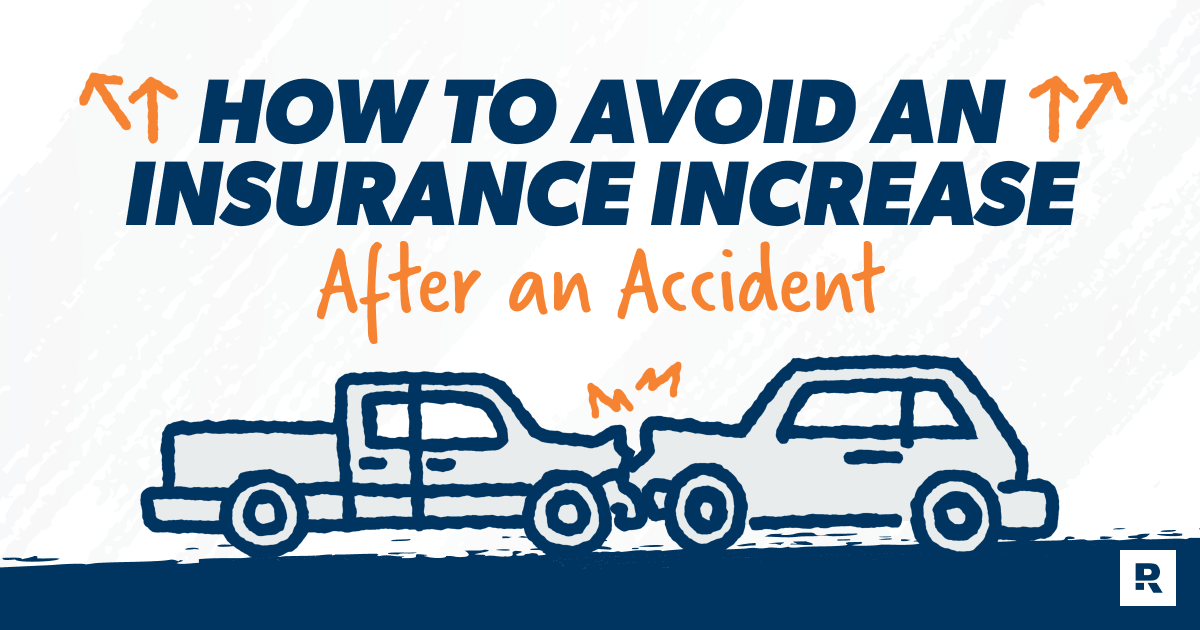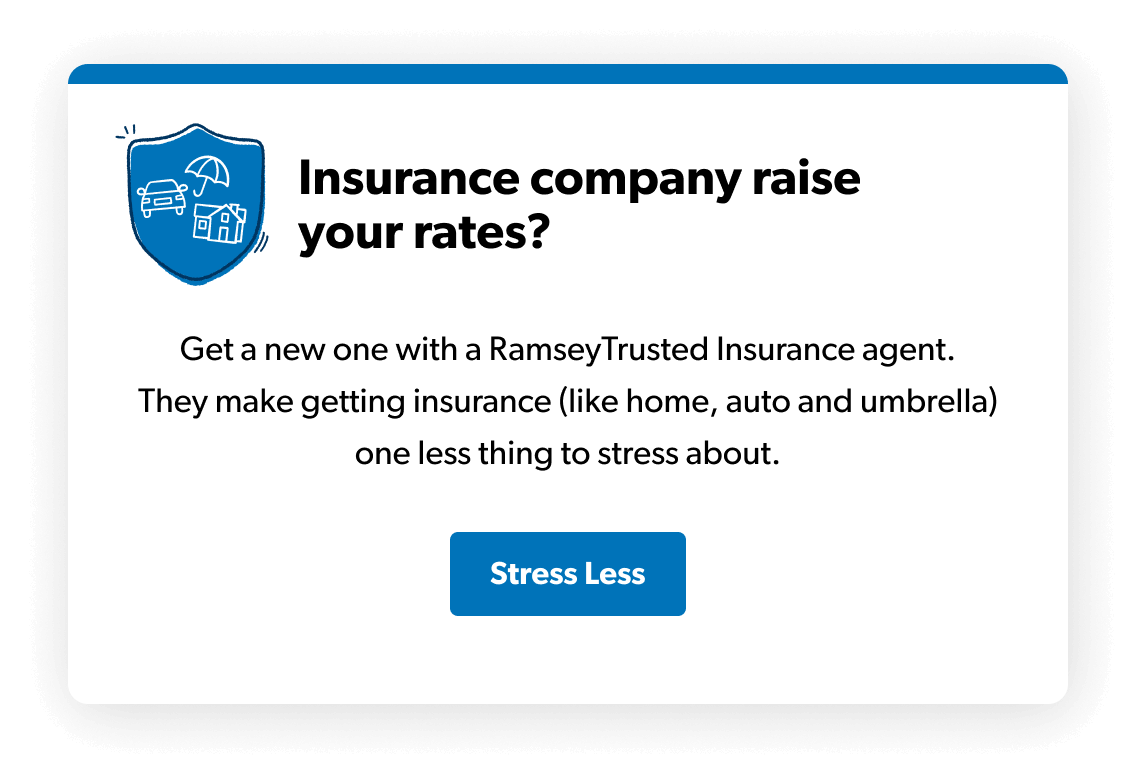How to Avoid an Insurance Increase After an Accident
6 Min Read | Jul 17, 2025

Key Takeaways
- Your car insurance can go up after an accident whether you’re at fault or not because your carrier will see you as a higher risk.
- The amount of your rate increase depends on things like who was at fault and how bad the accident was.
- Choosing not to make small claims, paying for an accident forgiveness rider, taking a driving course, and shopping around are ways to reduce or avoid rate increases.
- Accidents usually stay on your record about three to five years depending on your insurance carrier, the state you live in, and the severity of the accident.
Oh no—it happened. You had a car accident. And on top of all the hassle and expensive repairs, now your insurance rate might go up.
You’re right to expect a rate increase—it’s common for insurance to go up after an accident. But there are some things you can do to minimize it and maybe even avoid it.
What Happens to Your Insurance After an Accident?
In case you’re feeling particularly alone today, here’s a statistic that might help: There are an average of 16,817 car accidents a day in the U.S.[1] So, what happens to all those people’s car insurance rates after the collision?
How Much Does Insurance Go Up After an Accident?
There’s no exact number we can give you for how much your insurance will go up after an accident—there are too many factors that influence it. But your rate will increase by more if you were at fault than if you were hit by someone else.
Why Do Premiums Go Up After a Claim?
Being involved in an accident and making a claim indicates to your insurance company that you’re risky to insure—whether the accident was your fault or not. (Seriously! It could indicate that your car color blends in with the road or that you drive through tricky intersections a lot.) So they make you pay more to offset the risk. It’s called a surcharge.
At-Fault vs. Not-at-Fault Accidents
Unfortunately, even if you’re not at fault, your insurance rates could still go up. That’s why some people choose not to report the accident or file a claim when someone hits them if the damage is pretty minor. But if you do file a claim and your insurance company raises your rates, the price increase will probably be minimal.
If you’re at fault, though, you’ll likely see a substantial increase because the insurance company views one accident as an indicator that you’ll have more.
Factors That Determine Rate Increases
Not to be Captain Obvious, but being involved in an accident is a big factor in rate increases. That’s not the only reason your insurance could go up though.
Here are a few more things that could cause a rate hike:
- Comprehensive claims for things like a deer collision, storm damage or theft
- Increases in repair and replacement costs
- Another driver added to your policy
- Change of address
That doesn’t mean you’re stuck with it, though. Among our recommendations below, we suggest shopping around for better rates and switching carriers. This can help no matter why your rate went up.
How to Avoid an Increase in Insurance After an Accident
A rate increase may be unavoidable, but there are some things you can do following an accident to help keep it as small as possible.
Day of the Accident
- Don’t admit fault. This might be hard to hold back on, but even saying things like “I’m sorry” can be seen as an admission of fault. Let the police and insurance adjusters determine fault.
- Stay calm and document everything. Take photos of damage, write down names and any information offered by the other party, and trade insurance information.
- File a police report (if necessary). If you’re not sure whether the accident warrants filing a police report, you can call the local police department and ask.
- Contact your insurance agent, even if you don’t think the accident was your fault. With some policies, this is a requirement. Even if it’s not, your agent can help you navigate the process and any unexpected problems (like the other driver laying blame on you later).
After the Accident
- Avoid filing claims for minor damage and use your emergency fund for minor repairs if they cost less than your deductible.
- Ask your insurer if they’ll offer a discount on your premium if you take a defensive driving course—and sign up if they do.
- Keep a clean driving record going forward.
- Raise your deductible to lower your premium (if you have an emergency fund).
- Avoid lapses in coverage.
- Bundle policies.
- Switch carriers (shop around to see if you can get a better rate).
Keep in mind, none of these things are guaranteed to lower your rate. But hopefully at least one of them—or a combination—can help.
Do you have the right insurance coverage? You could be saving hundreds! Connect with an insurance pro today!
How Long Do Accidents Stay on Your Insurance Record?
Accidents usually stay on your insurance record for about three to five years. But this time frame is sometimes longer, depending on your specific insurance company, how bad the accident was, and where you live. State laws vary about how long an accident stays on your record.
So, if you’re in a major accident and your state’s laws keep it on the record for a long time, you might try moving to another state. That’s a joke—that actually wouldn’t be effective because states share traffic violation info.
What Is Accident Forgiveness and How Does It Work?
Some insurance companies offer an accident forgiveness rider (an add-on to a basic policy) for your first accident. With accident forgiveness, your insurer doesn’t count your first at-fault collision against you—as long as it’s pretty minor (think fender bender)—and your rates won’t increase when you renew your policy. But this is typically only available to customers with a long-standing clean driving record.
So, should you get accident forgiveness?
You may be thinking, Why wouldn’t I sign up for something that will magically make my accident not count against me?
Well, keep in mind: Accident forgiveness coverage usually costs extra. Some insurance companies offer this perk for free, but most of them charge for it. Our recommendation? Only go for it if it won’t jack up your premium too much. If you’ve never caused an accident, chances are good that you’ll never need a forgiveness rider—so it might not be worth paying for it.
Talk to a Trusted Insurance Pro
If your insurance company is bent on raising your rates no matter what you do, it might be time to switch carriers. Yeah, changing insurance companies can be a pain but not as bad as the squeeze from rising premiums.
Auto insurance companies are only incentivized to keep you as a customer for one to five years. That means your best bet for getting a better rate is to go somewhere else. The good news is, a RamseyTrusted® independent insurance agent can do the heavy lifting for you. They’ll shop rates with other carriers to find you the best price and make sure you have the coverage you need.
One of our pros found Adam D. a carrier that saved him over $700 a year while giving him better coverage than he had before.
“So worth it!” he said on the Ramsey Baby Steps Facebook community group.
Adam’s agent went line by line explaining the differences between the coverage he had and what the agent was proposing, showing how the new proposal was cheaper and better.
Adam is now a big fan.
“I’m on a corner with a megaphone,” Adam said.
The best part: It’s free to work with a pro.
Next Steps
- Still dealing with your accident? Learn about insurance claims so you can confidently navigate working with an adjuster.
- Next, read up on how to file an insurance claim.
- Shop around for a new rate with a RamseyTrusted independent agent.
-
I rear-ended someone—how much will my insurance go up?
-
How much your insurance goes up will depend on your policy and carrier, and on whether you’ve ever been in an accident before. If this is your first collision and you have a policy with accident forgiveness, your insurance may not go up at all.
-
How can I find cheap car insurance after an accident?
-
The best way to find inexpensive car insurance at any time is to shop around. Get quotes from multiple carriers and see which one can offer you the best rates. An independent insurance agent like the pros with RamseyTrusted can quickly do that for you for free.



